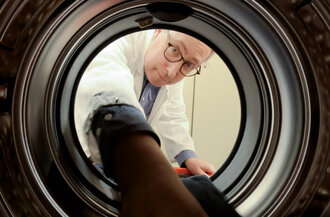
Head of study Prof. Egert sheds light on washing processes. Photo: HFU
Furtwangen University and Henkel publish study on the influence of a new enzyme on washing machine hygiene
Ninety-six percent of all private households in Germany own a washing machine. What many consumers do not know − washing machines, which are supposed to clean textiles, can be full of germs. Moisture, heat and a wide range of nutrients create ideal living conditions for the growth of microbes such as bacteria and fungi. Current trends, such as washing at low temperatures, water-saving programs and the use of bleach-free liquid detergents, can promote the growth of germs.
“Together with Henkel, we have been researching the microbial colonisation of washing machines for many years in order to improve the hygiene and sustainability of washing processes. Until now, enzymes in detergents have mainly targeted soiling on textiles. The new enzyme ”dispersin" not only ensures greater cleanliness and freshness in the laundry, but also targets biological soiling in the machine," explains Prof. Dr. Markus Egert, head of the study.
In modern detergents many different enzymes are used, targeting, for example, proteins (proteases), fats (lipases) and starch (amylases). These help to remove the relevant soiling from textiles. Soiling in the machine has so far been less of a focus. Dispersin is an enzyme that was first described for oral cavity bacteria of the genus Aggegatibacter and helps them to break down complex sugar bonds.
In the new study, state-of-the-art molecular biological methods were used to investigate how washing with liquid detergent containing two different concentrations of dispersin affects the composition of the bacterial community in the “sump”, i.e. the lowest area of the washing drum of washing machines. “We chose the sump as the sampling location because it provides a good overview of all the microbes that occur in a machine,” explains Prof. Egert.
After sixty wash cycles, in which standard soiled polyester laundry was washed, the washing machines in which dispersin was used showed a different bacterial community in the sump than machines in which dispersin was not used during washing. The diversity of bacteria was reduced and there was a strong increase in the relative abundance of bacteria related to the genus Rhizobium. These bacteria are currently interpreted as positive for washing machine hygiene, as they were found in greater numbers in machines that did not have an unpleasant inherent odour.
“Dispersin leads to changes in the microbial community of a washing machine, presumably via a specific degradation of soiling and biological deposits, which can currently be interpreted as positive in terms of washing machine hygiene,” summarises Prof. Egert. Further investigations will show how quickly the enzyme takes effect and shed more light on how individual groups of washing machine bacteria change quantitatively, and at different points in a machine, under the influence of the enzyme.
The study entitled “Dispersin-based modification of bacterial community composition in domestic washing machines” was carried out by AG Egert together with Henkel and was recently published in the Journal of Microbiological Methods.
Link to the study: https://www.sciencedirect.com/science/article/pii/S0167701225000703